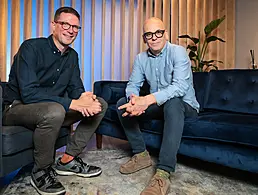From endless online applications to job interviews that take up your time and energy but lead nowhere, jobseeker burnout is a very real issue that if left ignored, can do a lot more than just internally smoulder.
Most of us will have either experienced or know someone who has experienced burnout at work. It’s an unfortunately common occurrence that can lead to a number of issues for the person dealing with it, as well as for employers and co-workers.
However, an aspect of burnout that arguably does not receive as much attention, despite being a significant hindrance to the collective workplace, is the issue of jobseeker burnout. But how exactly can jobseeker burnout affect the workplace, if the jobseeker isn’t actually working right now?
Well, burnout is a vicious cycle that most of us view in a linear way. That is to say, we think of the start and end of burnout as occurring at a brief moment in time, before being resolved. The person is burned out, therefore they leave their job, potentially enjoy a few days of respite, then they find a shiny new role and everything is great again.
Except that is a very unlikely scenario for someone who is already mentally and physically exhausted from the effects of burnout. What is far more plausible is that, at their lowest ebb, they leave their job hoping the next one will fulfil their goals. They begin their job hunt, only to have their optimism quashed by the never-ending barrage of applications, interviews and trials. When they do eventually get the job that they were chasing, it isn’t outside the realm of possibility that they would still be dealing with the negative feelings associated with burnout.
If you are concerned about the effects of jobseeker burnout, but are unsure of how to break the cycle, here are some tips and tricks to help you get relief.
Planning is your friend not your enemy
Sometimes, when we are overwhelmed, we shove all thoughts of the future to the back of our minds, but rarely does this help or make the issue go away.
You might feel as though you can’t really plan out job hunting, you simply apply and wait, but planning out your agenda, via pen and paper, audio notes or digitalised visual aids, can help unscramble the thought process and guide you through.
It can be helpful to consider a number of items, for example, you should define the kind of role you are looking for and in what industry. This is also an opportunity for you to research the standard salary for this title as well as your negotiating position based on your current qualifications.
You could also research the companies you are interested in working for, so when the time comes to issue CVs you will have a more comprehensive list that reflects your goals.
Discernment is not a negative quality
When job hunting, it is not unusual to consistently doubt your efforts, putting pressure on yourself with talk of ‘you could be doing more’, but ultimately this doesn’t add value to your search and likely won’t benefit you jobs-wise.
For example, many people when issuing CVs adopt a ‘close-your-eyes and click send-all’ policy. But often, because of the all-or-nothing approach, you might find yourself being offered an interview for a job that you are not qualified for, or that you are not interested in.
You might even research and attend the interview for the ‘benefit of the experience’ or to network, but this too might lead nowhere. When you send out loads of applications that don’t generate the leads you were hoping for, it can be incredibly demoralising.
By being more selective about what you want and what you are willing to strive for, you will find you are directing your energy at something that holds real value for you, even if it doesn’t always work out, versus wasting time and effort on an endeavour that doesn’t really bring you closer to your goals.
Maintain boundaries
Job hunting can often feel like a full-time job, leaving you exhausted and mentally drained by the day’s end. Even when you are done for the evening, the anxiety of that ‘I could be doing more’ mentality can weigh on you.
It can be helpful to set boundaries with yourself about the amount of time you are putting into your search for new employment. By giving yourself a set amount of hours per day, you make job hunting a task that you can leave behind when you clock off.
It may also be useful to make and follow a list of necessary activities, set within a reasonable timeframe, that you can tick off once they are done. This can help you to acknowledge and appreciate the work you are doing.
It can be exhausting looking for that perfect job, so when you do find it, don’t let the cycle of burnout continue, with your hard work going up in flames. Job hunting is just one more step before you end up where you are meant to be, but by keeping your own fire alive and burning, you will get there.
Find out how emerging tech trends are transforming tomorrow with our new podcast, Future Human: The Series. Listen now on Spotify, on Apple or wherever you get your podcasts.




